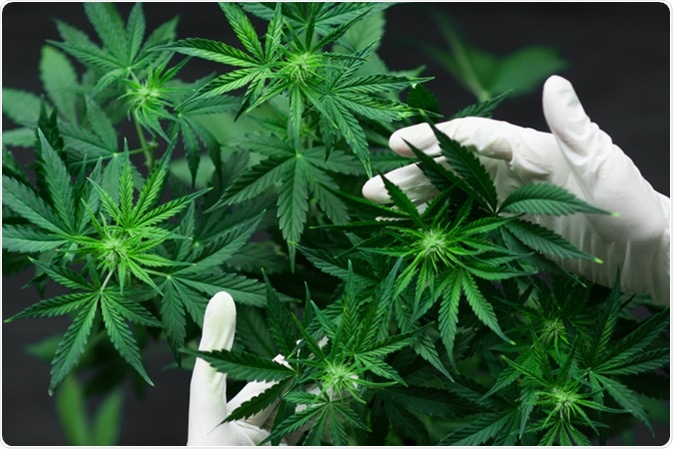
CBD Oil and Parkinson’s Disease
Cannabis is the most widely used recreational drug worldwide, with many variants that have been used both medicinally in the treatment or management of various diseases, including chronic pain, as well as being used recreationally to achieve a high.
Recently, Canada became the first major western country after Uruguay to legalize marijuana/cannabis for recreational and medicinal use and cultivation. The United Kingdom has now made an exception for medicinal cannabis in the treatment of severe epilepsy, chemotherapy-related illness and multiple sclerosis, while still retaining a Class B illegal status for recreational usage (possession and distribution).

Lifestyle Discover / Shutterstock
What is CBD oil?
Medical cannabis is often sold as cannabidiol (CBD) oil. It is a major cannabinoid from hemp plants. However, CBD oil does not usually contain tetrahydrocannabinol (THC) which is the main psychoactive substance of cannabis. Dried cannabis can also be sold in some countries/states as medical marijuana, and often produces the full effects of cannabis.
Can CBD oil treat Parkinson’s?
Parkinson’s disease clinically manifests as dyskinesia (impairment of movement), resting tremor, bradykinesia (slow movements), dystonia (stiffness of muscles including facial muscles), a stooped posture, drooling, sexual and urinary dysfunction, and in some cases psychiatric symptoms including psychosis, dementia and depression.
The brain has a rich expression of cannabinoid receptors in various sites, such as the G-protein coupled receptor GPR6 within the basal ganglia (a key part of the brain affected by Parkinson’s). Studies investigating the oral intake of CBD oil (and smoking cannabis) in the treatment of Parkinsonian symptoms have observed generally positive results.
One observational study reported rapid alleviation of Parkinsonian symptoms (including bradykinesia and tremor) upon cannabis smoke inhalation (CBD + THC) in around 79% of patients (out of 28). In another study, 56% of a small cohort of patients showed improvement in mood and sleep issues.
In a larger study of 339 Czech patients with Parkinson’s who were routinely using cannabis leaves orally (CBD + THC), there was significant improvement in resting tremors, bradykinesia and rigidity with little or no side effects overall. Symptoms were ameliorated particularly in patients who had been using cannabis for over 3 or more months.
Studies focusing on the use of CBD oil alone show mixed results. One study showed that oral CBD oil reduced psychotic symptoms in Parkinson’s patients, but with little effect on dyskinesia. However, it produced generic improvement in physical state as well as in insomnia-related issues. Larger studies are necessary to confirm these findings, however, as these studies had a relatively small sample size (<20).
Summary
Cannabis has many proven beneficial effects on health, especially in neurology and psychiatry. More research is desperately needed to convince governments to legalize medicinal cannabis for treatment purposes, following Canada’s example)
Nnumerous observational studies have reported improvement in symptoms with the use of CBD oil by patients with Parkinson’s, Alzheimer’s and MS patients. However, some studies have questioned the efficacy of CBD oil alone, or if THC, linalool and limonene extracts should also be incorporated in the specific treatment of these conditions, such as for neuroprotection.
Unlike THC, CBD oil alone does not show the psychoactive properties of cannabis. For this reason THC must be administered in a careful and controlled way. Unfortunately, as long as cannabis remains a controlled drug under most international laws, research is hampered and the stigma associated with it remains. It is an encouraging sign in the UK that the use of medicinal CBD oil is now allowed for the most severe cases, but the law needs to move to full decriminalization to allow the use of THC oil as well, and to encourage more investment in medical research on the effects of cannabis on health.
Sources
- Russo EB, 2018. Frontiers in Integrative Neuroscience 12:51
- www.projectcbd.org/.../cbd-and-parkinsons-disease
- https://www.imdb.com/title/tt2386281/
Further Reading
Last Updated: Jan 25, 2019

































No hay comentarios:
Publicar un comentario